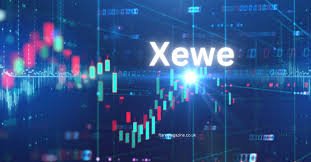Table of Contents
What is Xewe?
Xewe is an exchange-traded fund (ETF) that focuses on environmental, social, and governance (ESG) criteria while tracking the performance of the S&P 500 Equal Weight ESG Index. This unique fund provides investors with exposure to companies within the S&P 500, emphasizing those committed to sustainable and ethical practices. The ETF adopts an equal-weighting strategy, meaning each company in the index holds an equal share, reducing the impact of any single company on the portfolio’s overall performance.
The goal of Xewe is to offer a balanced investment approach by integrating ESG principles into the traditional S&P 500 framework. This makes it an appealing choice for investors who are keen on supporting companies with strong ESG practices while enjoying the potential benefits of the broader U.S. stock market. By investing in Xewe, individuals can align their financial goals with their values, contributing to a more sustainable future without compromising on returns. This ETF reflects a growing trend towards responsible investing, where financial gain is pursued alongside social and environmental responsibility. As such, Xewe represents a modern investment tool designed to cater to the needs of conscientious investors looking for both profit and purpose.
Understanding ESG Criteria in Xewe
ESG criteria are a set of standards used to evaluate a company’s operations in terms of environmental stewardship, social impact, and governance practices. These criteria help investors identify companies that are not only profitable but also contribute positively to society and the environment. The environmental aspect focuses on how a company uses resources, manages waste, and addresses climate change. Social criteria examine how a company treats its employees, customers, and communities. Governance involves evaluating a company’s leadership, internal controls, and shareholder rights.
In Xewe, the ESG criteria serve as a filter to ensure that only companies with strong ethical practices are included in the fund. By integrating ESG factors, Xewe aims to reduce investment risks associated with regulatory penalties or reputational damage that may arise from poor ESG practices. Companies with high ESG scores often show better operational efficiencies and long-term growth prospects, making them attractive investments. This approach aligns with the growing demand for sustainable investing, where financial decisions consider both profit and positive impact on society.
Why is ESG Important in Investing?
Investing with ESG criteria has gained significant traction as investors become more aware of the ethical and long-term financial benefits. Companies with robust ESG practices are often more resilient, as they can better manage risks related to environmental disasters, social unrest, or governance scandals. For example, businesses that prioritize reducing their carbon footprint may avoid future costs associated with environmental regulations.
Furthermore, ESG investing helps align investments with personal values, allowing investors to support companies that contribute positively to global challenges like climate change and social inequality. This strategy not only fulfills ethical considerations but also enhances potential returns by focusing on companies that are prepared for future market demands and regulatory landscapes. Overall, ESG investing reflects a shift towards integrating ethical considerations into financial decisions, fostering a more sustainable and equitable future.
Investment Strategy and Portfolio Composition
Xewe employs an equal-weighting strategy in its portfolio structure, meaning each company in the index holds an equal share, regardless of its market capitalization. This approach contrasts with traditional market-cap-weighted indices, where larger companies hold more influence. By equally weighting each component, Xewe minimizes concentration risk, ensuring that no single company or sector can disproportionately impact the fund’s performance.
The portfolio is periodically rebalanced to maintain equal weighting and adapt to changes in company performance or ESG ratings. This dynamic approach allows Xewe to remain aligned with its ESG criteria while providing diversified exposure to the market. The fund’s emphasis on ESG screening further refines its selection, excluding companies that fail to meet established ethical and sustainability standards. This dual approach of equal weighting and ESG criteria makes Xewe a unique investment proposition for those seeking diversified and responsible investment options【18†source】【19†source】.
Comparing Xewe with Traditional ETFs
Xewe differs from traditional ETFs, primarily in its focus on ESG criteria and its equal-weighting strategy. While traditional S&P 500 ETFs are market-cap weighted, favoring larger companies like Apple and Microsoft, Xewe gives equal exposure to all companies in the index. This approach provides more balanced market exposure and reduces the risk of volatility associated with any single large-cap stock.
In addition to its structure, Xewe’s ESG focus sets it apart from conventional funds. Traditional ETFs may include companies with varying degrees of commitment to sustainability, whereas Xewe specifically targets companies with strong ESG practices. This focus aligns with the increasing demand for investments that not only deliver financial returns but also contribute to social and environmental goals. By offering a distinct blend of diversification and ethical investment, Xewe caters to investors looking to integrate their financial strategies with their values.
Performance Analysis
Xewe’s performance is evaluated by examining its historical returns and volatility compared to its benchmark index and other ETFs. As an ESG-focused ETF, Xewe has generally demonstrated competitive returns, driven by the growing emphasis on sustainability among investors. Companies with high ESG ratings are often favored by the market, leading to potential outperformance.
Historical data indicates that Xewe’s equal-weighting approach contributes to its stability, as it mitigates risks associated with large-cap stocks dominating the portfolio. However, its performance can be influenced by broader market conditions, geopolitical events, and changes in investor sentiment towards ESG investing. Investors should consider these factors when assessing Xewe’s potential benefits and risks.
Risks and Challenges
While Xewe offers many advantages, it also faces certain risks and challenges that investors need to be aware of. One primary risk is market volatility, especially in sectors sensitive to ESG criteria changes or economic shifts. For instance, companies may face backlash if they fail to uphold their ESG standards, affecting Xewe’s overall performance.
Additionally, the exclusion of certain industries due to ESG criteria can lead to sector biases, potentially impacting the fund’s returns. Moreover, as with any investment, Xe we is subject to economic downturns, interest rate changes, and geopolitical events that could affect its value. Investors should carefully weigh these risks against potential returns when considering Xe we as part of their investment strategy.
How to Invest in Xewe
Investing in Xewe involves several steps, beginning with defining your investment goals. Understanding whether you seek long-term growth, diversification, or a focus on sustainable investments will help determine if Xewe aligns with your strategy. Conduct thorough research on Xe we’s structure, historical performance, and ESG criteria to gain a comprehensive understanding.
Once you are prepared, open a brokerage account if you do not have one already. Choose a reputable brokerage that offers access to Xe we and provides user-friendly platforms and educational resources. Fund your account with the desired investment amount, ensuring you meet any minimum deposit requirements. Using your brokerage platform, search for Xewe by its ticker symbol, decide on the number of shares you wish to purchase, and place a buy order. Regularly monitor your investment, review quarterly reports, and stay informed about changes in the ETF’s holdings.
Common Mistakes to Avoid
Investing in Xe we can be rewarding, but it is important to avoid common pitfalls. One mistake is failing to conduct sufficient research. Understanding Xe we’s structure, performance, and ESG criteria is crucial before making an investment. Overconcentration is another risk; diversifying your investments across different asset classes can help spread risk.
Ignoring fees can also be detrimental. While Xe we generally has lower fees than actively managed funds, it is important to be aware of any costs associated with your brokerage account and the ETF itself, as high fees can erode returns over time. Lastly, avoid trying to time the market based on short-term fluctuations. Focus on long-term investing and stick to your investment plan, periodically rebalancing your portfolio to maintain your desired asset allocation.
The Role of Xewe in a Diversified Portfolio
Xewe can play a significant role in a diversified investment strategy by offering balanced exposure to companies with strong ESG practices within the S&P 500. Its equal-weighting and ESG-focused approach provides a unique investment opportunity that aligns financial returns with sustainability goals. As part of a broader portfolio, Xe we can serve as a core holding, providing stability and diversification【18†source】【19†source】.
By combining Xewe with other asset classes, such as bonds or international equities, you can create a well-rounded portfolio that balances risk and return while supporting ethical investment practices. Xe we’s ESG criteria help investors align their portfolios with personal values, allowing them to contribute to a more sustainable future.
Long-Term Investment Outlook
Xewe is particularly suited for long-term investors who prioritize sustainability and ethical considerations. The benefits of ESG investing and equal weighting may take time to materialize, making Xe we an ideal choice for those willing to hold their investments over an extended period. Long-term investors can benefit from the compounding effect of returns and the potential for stable growth aligned with ESG principles.
Evaluating Xe we’s long-term performance involves analyzing historical returns, volatility, and alignment with ESG criteria. Comparing its performance with other investment options helps assess how it contributes to overall investment goals. By maintaining a focus on long-term strategies, Xewe can continue to meet investor expectations and adapt to evolving market conditions.
Conclusion
Xewe represents a growing trend in the investment landscape, emphasizing the importance of environmental, social, and governance factors. By providing exposure to companies with strong ESG practices, Xewe offers investors a compelling opportunity to align their financial goals with their values. As awareness of sustainability and ethical investing continues to rise, Xewe stands out as a valuable tool for those seeking responsible and diversified investment options.
Read More : Aliasshare.shop







